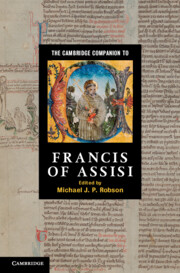Book contents
- Frontmatter
- Introduction
- PART I Francis of Assisi
- PART II The heritage of Francis of Assisi
- 10 Francis and the pursuit of learning
- 11 The early Franciscans and the towns and cities
- 12 The Third Order of Francis
- 13 Franciscan ideals and the royal family of France (1226–1328)
- 14 Franciscans as papal and royal envoys to the Tartars (1245–1255)
- 15 Franciscan missions
- 16 Pope John XXII, the Franciscan order and its Rule
- 17 The ecumenical appeal of Francis
- A guide to further reading
- Index
14 - Franciscans as papal and royal envoys to the Tartars (1245–1255)
from PART II - The heritage of Francis of Assisi
Published online by Cambridge University Press: 28 November 2011
- Frontmatter
- Introduction
- PART I Francis of Assisi
- PART II The heritage of Francis of Assisi
- 10 Francis and the pursuit of learning
- 11 The early Franciscans and the towns and cities
- 12 The Third Order of Francis
- 13 Franciscan ideals and the royal family of France (1226–1328)
- 14 Franciscans as papal and royal envoys to the Tartars (1245–1255)
- 15 Franciscan missions
- 16 Pope John XXII, the Franciscan order and its Rule
- 17 The ecumenical appeal of Francis
- A guide to further reading
- Index
Summary
INTRODUCTION
Gregory IX, a keen patron of the newly founded mendicant orders, increasingly resorted to them as instruments of papal authority, notably as Crusade preachers and as diplomatic envoys. And towards the end of his pontificate, these developments received an unexpected boost from the appearance of the Mongols (more commonly known as ‘Tartars’) on the horizons of the Latin world. The Mongols were engaged in a mission of world conquest that they believed to have been entrusted by heaven to the empire's founder, Chinggis Khan (d. 1227), and campaigns headed by his senior grandson, Batu, reduced the nomadic tribes of the Eurasian steppe and the principalities of the Rus, and in 1241–2 devastated Poland, Moravia and Hungary. In the course of this first attack on Latin Christian territory, the mendicants suffered alongside other sections of the Catholic Church. Friars were among those massacred; and, according to the Franciscan guardian of Prague, the invaders had destroyed at least two of the Franciscan custodies in eastern Europe.
When Innocent IV convened the Council of Lyons (1245), the most recent – and the most accurate – intelligence concerning the Mongols had been provided by an émigré Russian ecclesiastic named Peter. It seems that Peter's responses to the questions put to him by the pope and the cardinals served as a framework around which at least one of the papal ambassadors to the Mongols would structure his own report; and certainly his statement that the Mongols received envoys favourably (benigne) and sent them back promptly must have encouraged the curia to enter into diplomatic relations with the newcomers.
- Type
- Chapter
- Information
- The Cambridge Companion to Francis of Assisi , pp. 224 - 239Publisher: Cambridge University PressPrint publication year: 2011
- 1
- Cited by



